De Duitstalige (Italiaanse) dichter en schrijver Joseph Zoderer werd geboren op 25 november 1925 in Meran in Zuid-Tirol. Zie ook alle tags voor Joseph Zoderer op dit blog.
Uit: Die Walsche
„Sie hatte Silvano zuletzt anschreien müssen: Bleib daheim, bis er endlich verstand und daheim blieb im italienischen Stadtteil, der von den Deutschen Schanghai genannt wurde.
Ich bin ein feiges Luder, sagte sie litaneienhaft vor sich hin, fast im Rhythmus des Rosenkranzgemurmels, das aus dem Nebenzimmer, wo sie ihren Vater, den Lehrer, aufgebahrt hatten, in die Stube hereindrang. Sie hätte Silvano das Mitkommen nicht verwehren dürfen zum Begräbnis ihres Vaters, für ihn aus dem Süden etwas Heiliges, Selbstverständliches, eine Sache des Respekts und der Ehrerbietung, ganz gleich, ob nun ihr Vater die Spaghetti, die Silvano einmal in dem Lehrerhaus gekocht hatte, dem Wolfshund hier neben diesem Tisch zum Fressen auf den Stubenboden hingestellt oder ob er ihn, den Italiener, einfach nur für einen Windbeutel gehalten hatte.
Sie hatte ihn nicht wie irgend jemanden, schon gar nicht wie einen geliebten Menschen behandelt, sondern wie einen Walschen, der in dieser Welt hier, in der deutschen, nichts zu suchen hatte, der besser draußen blieb, sie hatte ihn hinausgedrängt, wenn auch eigentlich nur abgedrängt, nicht hereingelassen, um nicht noch mehr Scherereien zu haben, gewiß, um ihm Belästigung zu ersparen. Sie paßte sich an, sie tat ihm Unrecht, sie, die sich seit langem darum angeblich nicht mehr scherte und trotz der Redereien der Leute, trotz des Widerstands ihres Vaters lebte wie sie wollte, nämlich mit Silvano, aus dem nun einmal kein Deutscher zu machen war. Und sie hatte ihn nicht geheiratet, sie, jetzt mitten in den Dreißig.
Beim Begraben ihres Vaters sollte Ruhe sein. Und so war sie allein den ihr entgegenkommenden Wolken zugefahren, um allein zu erledigen, was hier erledigt werden mußte, wenn jemand gestorben war, um Ruhe zu haben, also aus Angst vor den anderen war sie allein heraufgefahren in dieses Nest auf tausenddreihundert Meter über dem Meer, sehr weit entfernt von Ebbe und Flut, in dieses Bergloch, aus dem ihr Vater nicht wegzukommen imstande gewesen war, obwohl er früher oft ausgerufen hatte: Hinaus in die Welt, nichts als hinaus in die Welt.
Himmel war das keiner, in den sie zurückfuhr, das wußte sie zu gut, die Leute hatten sich nicht geändert, sie waren nur freundlicher geworden, im Gesicht, und sogar der Ploser hatte den alten Hof, Haus und Stadel, niedergerissen und eine Pension gebaut.
In der letzten Kurve vor dem Ortsschild dachte sie: diese Dotterblumen, diese gelben Knollen, Silvano hätte sich darüber gefreut.
Die Nachbarn hatten den Lehrer, ihren Vater, im völlig ausgeräumten, also kahlen und kalten Schlafzimmer aufgebahrt auf Brettern, unter die zwei Malerböcke geschoben waren. Über die Leiche, die nach altem Brauch nicht gewaschen und ohne Schuhe in den Sonntagsanzug gesteckt worden war, hatten sie ein abgenutztes, wenn auch gebügeltes weißes Leintuch bis zum Kinn hinaufgezogen.“
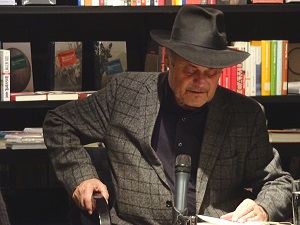
Joseph Zoderer (Meran, 25 november 1935)
De Australische (Aboriginal) schrijfster Alexis Wright werd geboren op 25 November 1950 in de Gulf of Carpentaria. Zie ook alle tags voor Alexis Wright op dit blog.
Uit: Tracker
“Tracker should have had a personal secretary taking down all of his ideas and patenting them, but he gave them away freely in conversations, with the action plans for projects that were on an enormous scale, or small community projects to create income from commercial activities. All of these ideas depended on the understanding of people from government, professional workers and developers; and mostly, his thinking was more advanced than theirs, and they would not have the willingness, or ability, or resources, to put plans they had not thought of themselves into action, with the paperwork they required.
Some of these ideas can be seen in the opportunities he created for thousands of Aboriginal people. But the full legacy of his work and thinking lives with the people who heard his stories, experienced his wit, or worked with him. He always left the details for others, those who listened to him, and in the work they did with him. You could say that his visionary ideas will be missed by Aboriginal people, but much of his work still lives in the minds of some of the best thinkers in the country. Tracker’s legacy is in this archive, his filing cabinet, the minds of other people. The road maps or blueprints of the vision splendid, el grande plano, are spread among people of all walks of life around the country – the politicians and political thinkers, economists, resource and land developers, media representatives, Aboriginal communities and their leaders, and the everyday people who were Tracker’s mates. Some of this rich tapestry of knowledge has been drawn from the vaults of these other peoples’ minds, and told in this book.
I have always thought that all stories are important, but stories only come to life and stay alive when they are being imagined and remembered, and then in the telling, how they are retold to make sure they are being heard. The problem with creating this book was the question of how you would write a story about someone who challenged all expectations? Tracker used to say, I want you to write something for me, Wrighty. But how could you do the imagining on behalf of someone who was impossible to keep up with, who could never be contained, who never wanted to sit still long enough to go through the details time and again, as a writer would need to do to get the story right.”
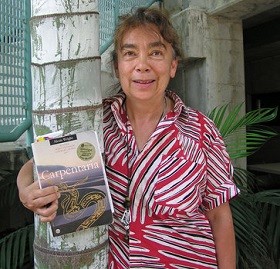
Alexis Wright (Gulf of Carpentaria, 25 November 1950)
De Engelse dichter Isaac Rosenberg werd geboren in Bristol op 25 november 1890. Zie ook alle tags voor Isaac Rosenberg op dit blog.
The Nun
So thy soul’s meekness shrinks,
Too loth to show her face-
Why should she shun the world ?
It is a holy place.
Concealed to itself
If the flower kept its scent,
Of itself amorous,
Less rich its ornament.
Use-utmost in each kind-
Is beauty, truth in one,
While soul rays light to soul
In one God-linked sun.
The Blind God
Streaked with immortal blasphemies,
Betwixt His twin eternities
The Shaper of mortal destinies
Sits in that limbo of dreamless sleep,
Some nothing that hath shadows deep.
The world is only a small pool
In the meadows of Eternity,
And men like fishes lying cool ;
And the wise man and the fool
In its depths like fishes lie.
When an angel drops a rod
And he draws you to the sky
Will you bear to meet your God
You have streaked with blasphemy?
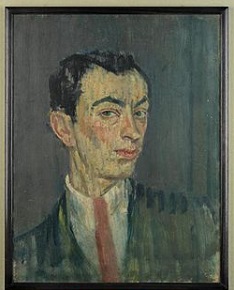
Isaac Rosenberg (25 november 1890 – 1 april 1918)
Self-portrait in a Pink Tie, 1914
De Portugese schrijver José Maria Eça de Queiroz werd geboren op 25 november 1845 in Póvoa de Varzim. Zie ook alle tags voor José Maria Eça de Queiroz op dit blog.
Uit: Stadt und Gebirg (Vertaald door Luise Ey)
„Während der Infant in der Verbannung zu Wien schmachtete, stieß der dickleibige Dom Galiaon Sehnsuchts-seufzer nach seinem »Engelchen« aus und intrigierte für seine Rückkehr. Während des Krieges mit dem »andern, dem Freimaurer«, schickte er dem König durch Boten gekochten Schinken, Eingemachtes, Flaschen mit seinem Wein von Tarrafal und seidene Beutel voll Goldstücke, die er abseifte, damit sie schön glänzten. Und als er erfuhr, daß Dom Miguel mit zwei alten, auf ein Maultier geschnallten Koffern den Weg nach Sines in das endgültige Exil eingeschlagen hatte, da lief Jacintho Galiaon nach Hause, schloß wie zur Trauer alle Fenster und schrie wütend: »Ich bleib’ auch nicht hier! Ich bleib’ auch nicht hier!« Nein, er wollte nicht in dem entarteten Lande bleiben, aus dem, entblößt und landesverwie-sen, dieser König von Portugal auszog, der die Jacinthos von der Straße aufzuheben pflegte! Er schiffte sich nach Frankreich ein, samt seiner Frau, der Senhora Donna Angelina Fafes, aus dem berühmten Hause der Fafes da Avellan, sowie seinem Sohn, dem Cinthinho, einem gelben, verweichlichten Jungen, der Wärterin und einem Negerknaben. An der kantabrischen Küste begegnete das Paketboot einer so schweren See, daß Donna Angelina ganz erschöpft auf den Knieen auf ihrem Lager in der Kabine dem »Senhor dos Pas-sog«, dem Christus der Leidensstationen von Alcantara, eine goldene Dornenkrone gelobte, mit Blutstropfen aus Rubinen von Pegu. In Bayonne, wo sie anliefen, hatte Cinthinho die Gelbsucht. Auf der Fahrt nach Orleans brach in stürmischer Nacht die Achse des Reisewagens, und der feiste Herr, die zarte Dame aus dem Hause da Avellan und der Knabe marschierten drei Stunden im Regen und Schmutz der Verbannung bis zu einem Dorfe, wo sie, nachdem sie wie Bettler an stummen Türen gepocht, auf den Bänken einer Schenke schliefen. In dem »Hotel des Saints Peres« zu Paris hatten sie die Schrecken einer Feuersbrunst auszustehen, die im Pferdestall un-ter dem Zimmer Dom Galiaons ausbrach, und der würdige Fidalgo trat, nachdem er sich im Nachthemd die Treppen hinab in den Hof geschleppt hatte, mit dem bloßen Fuße in einen Glassplitter.“
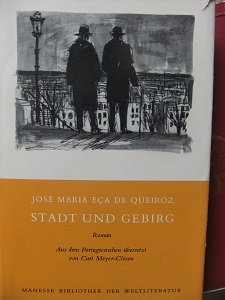
José Maria Eça de Queiroz (25 november 1845 – 16 augustus 1900)
Cover
De Spaanse dichter en schrijver Lope de Vega werd geboren op 25 november 1562 in Madrid. Zie ook alle tags voor Lope de Vega op dit blog.
Departing but to stay, and staying to depart
Departing but to stay, and staying to depart,
to leave–soulless–bearing another’s soul along,
being th’mast’s forever-captive heart
listening to the sweet sirenic song
imprisoned. To consume Self, and, burning
like th’candle’s growing towers in the tender
sand, fall out of Heaven! watching (in luscerning
fires) a still bright suffering demon–Lucifer’s defender.
To deny what’s true, and the contrary,
converse alone in the unspeaking solitude
(winds weaving round th’pallid asphodel)
–Oh, to name eternal what is temporary
this is what’s called on earth Absence’s ‘disquietude,’
‘ardorous fires’ by the soul, and during life: a ‘hell.’
Love’s poetry, the random concept’s mind
Love’s poetry, the random concept’s mind
engendered in the cautious soul (in my care)
born from my bubbling senses, intertwined,
less from compliancy writ than despair—
O world abandoned, lost, and all but dead,
shattered & changed, distorted do you trod
the earth–Only where you were begot
would you be recognized, O artly bred!
You rob Crete’s labyrinth, take
Dedalus’s lofty thoughts & dreams, the seas’
tremendous fury, th’abyss’ Flame:
If th’asp will not (of what is yours) partake,
renounce the ground and entertain the breeze–
There you’ll be nestling on your own midst’s same.
Vertaald door S.D. Rodrian
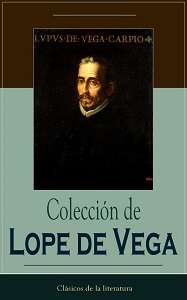
Lope de Vega (25 november 1562 – 27 augustus 1635)
Cover
De Canadese dichteres en schrijfster Isabel Ecclestone Mackay werd geboren op 25 november 1875 in Woodstock, Ontario. Zie ook alle tags voor Isabel Ecclestone Mackay op dit blog.
Little Brown Bird
O little brown bird in the rain,
In the sweet rain of spring,
How you carry the youth of the world
In the bend of your wing!
For you the long day is for song
And the night is for sleep–
With never a sunrise too soon
Or a midnight too deep!
For you every pool is the sky,
Breaking clouds chasing through,–
A heaven so instant and near
That you bathe in its blue!–
And yours is the freedom to rise
To some song-haunted star
Or sink on soft wing to the wood
Where your brown nestlings are.
So busy, so strong and so glad,
So care-free and young,
So tingling with life to be lived
And with songs to be sung,
O little brown bird!–with your heart
That’s the heart of the Spring–
How you carry the hope of the world
In the bend of your wing!
The Coming Of Love
How shall I know? Shall I hear Love pass
In the wind that sighs through the poplar tree?
Shall I follow his passing over the grass
By the prisoned scents which his footsteps free?
Shall I wake one day to a sky all blue
And meet with Spring in a crowded street?
Shall I open a door and, looking through,
Find, on a sudden, the world more sweet?
How shall I know?–last night I lay
Counting the hours’ dreary sum
With naught in my heart save a wild dismay
And a fear that whispered, ‘Love is come!’
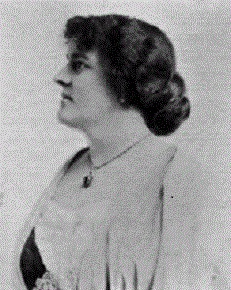
Isabel Ecclestone Mackay (25 november 1875 – 15 augustus 1928)
